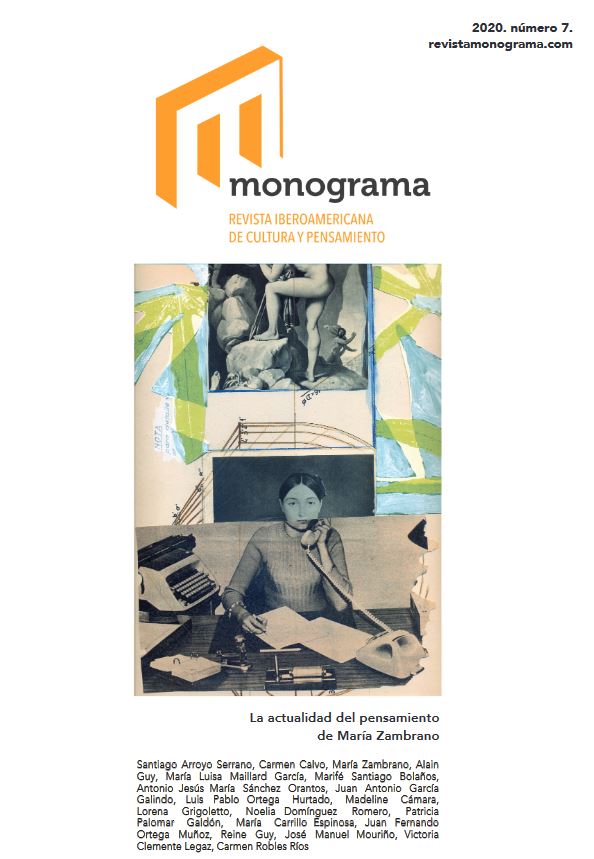Notes for a Crisis
DOI:
https://doi.org/10.36008/monograma.202.07.1716Keywords:
Crisis, Wisdom about the Soul, Mysticism, Job, AntigoneAbstract
This article is dedicated to an early essay by the Andalusian philosopher María Zambrano entitled La vida en crisis (1942). The aim of this analysis is to examine the clues offered by the author on the definition of a crisis and the possible way out of it. In order to outline a fuller picture of her thought, relationships will be established with other texts from the same period included in her book Hacia un saber sobre el alma (1950). In the same way, we will see the continuity of these thoughts in mature texts such as El hombre y lo divino (1955), La tumba de Antígona (1967), and Los bienaventurados (1990). These texts all together open the hypothesis that for the Andalusian writer the way out of a crisis is a consequence of the recovery of what she calls «saber sobre el alma» (wisdom about the soul). That is, only after building a space for inner reflection, in the terms specified by the author, is it possible to go through a period of crisis in a serene manner.
Downloads
References
ABELLÁN, J. L. (2004). «María Zambrano, alondra de la filosofía». En María Zambrano. La visión más transparente. Beneyto, J. M. y González Fuentes, J. A. (eds.). Madrid: Trotta, pp. 311-318.
BUNGARD, A. (2000). Más allá de la filosofía: sobre el pensamiento filosófico-místico de María Zambrano. Madrid: Trotta.
CIOCCHINI, H. (1979). «La santa realidad sin nombre. En torno a Claros del bosque de María Zambrano», Ínsula, 388, p. 3.
CRUZ AYUSO, C. (2005). «“Advertencia” sobre la agonía de Europa». En Actas del congreso internacional del centenario de María Zambrano. Madrid, 2004. Tomo II. Crisis cultural y compromiso civil en María Zambrano. Vélez-Málaga: Fundación María Zambrano, pp. 166-174.
ORTEGA Y GASSET, J. (1947) «La razón histórica». En Obras completas. Tomo XII. Madrid: Revista de Occidente, pp. 263-266.
ORTEGA Y GASSET, J. (1942). Ideas y creencias. Madrid: Revista de Occidente.
GUY, A. (1984). «María Zambrano intérprete del alma, de las ruinas y de Job», Cuadernos Hispanoamericanos, 413, pp. 55-65.
MORA GARCÍA, J. L. (2015). «María Zambrano. Una filosofía para afrontar el fracaso», Aurora, 16, pp. 52-64.
MUÑIZ-HUBERMAN, A. (1998). «María Zambrano y el Libro de Job». En Homenaje a María Zambrano. Estudios y correspondencia. VALENDER, J. et al. México: El Colegio de México, pp. 61-66. https://doi.org/10.2307/j.ctv47w4rf.8.
REVILLA GUZMÁN, C. (2018). «Europa en la perspectiva del exilio de María Zambrano», Lectora, 24, pp. 27-43.
ROMERO, F. (1944). Filosofía de la persona. Buenos Aires: Losada
SOTO GARCÍA, P. y ESPINOZA LOLAS, R. (2015). «Xavier Zubiri y María Zambrano: de la crisis europea a una reforma del entendimiento», Pensamiento, vol. 71, núm. 266, pp. 435-457. https://doi.org/10.14422/pen.v71.i266.y2015.011.
STANTON, A. (1998). «Alfonso Reyes y María Zambrano: una relación epistolar». En Homenaje a María Zambrano. Estudios y correspondencia. Valender, J. et al. México: El Colegio de México, pp. 93-141. https://doi.org/10.2307/j.ctv47w4rf.11.
ZAMBRANO, M. (1937). Los intelectuales en el drama de España. Santiago de Chile: Panorama.
ZAMBRANO, M. (1939). Pensamiento y poesía en la vida española. México: La Casa de España.
ZAMBRANO, M. (1939). La agonía de Europa. Buenos Aires: Sudamericana, 1945.
ZAMBRANO, M. (1950). Hacia un saber sobre el alma. Buenos Aires: Losada. Segunda edición aumentada 1987, Madrid: Alianza.
ZAMBRANO, M. (1955). El hombre y lo divino. México: Fondo de Cultura Económica. Segunda edición aumentada 1973, México: Fondo de Cultura Económica.
ZAMBRANO, M. (1990). Los bienaventurados. Madrid: Siruela.
ZAMBRANO, M. (2012). La tumba de Antígona. Edición crítica de Virginia Trueba Mira. Madrid: Cátedra. Primera edición 1967, México: Siglo xxi.
Downloads
Published
How to Cite
Issue
Section
License
Copyright (c) 2020 Monograma. Revista Iberoamericana de Cultura y Pensamiento

This work is licensed under a Creative Commons Attribution-NonCommercial-NoDerivatives 4.0 International License.
Esta obra está bajo una licencia de Creative Commons Reconocimiento-NoComercial-SinObraDerivada 4.0 Internacional






